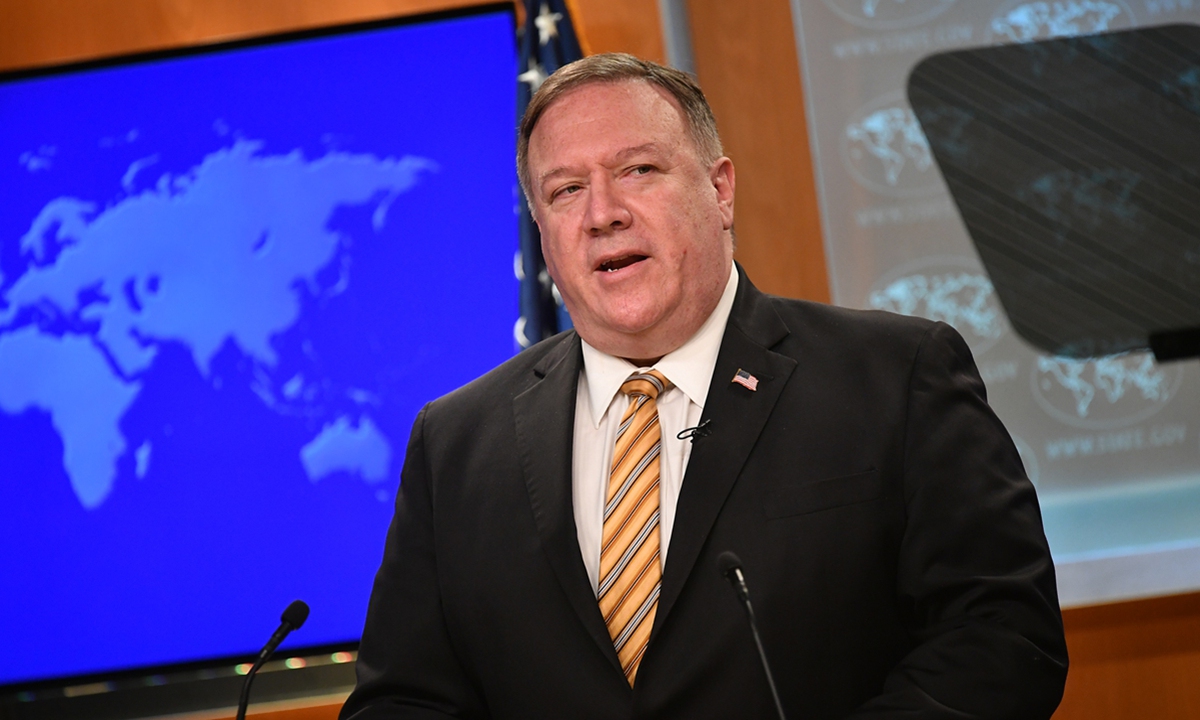Lukewarm global response to US’ anti-China alliance: Global Times editorial
Source: Global Times Published: 2020/7/31 22:23:41

US Secretary of State Mike Pompeo File photo: AFP
In testimony before the Senate Foreign Relations Committee on Thursday, US Secretary of State Mike Pompeo said US diplomatic efforts against the Communist Party of China are working and "the tide is turning." He boasted the ban on Huawei in some countries and territories and EU's statement on the Hong Kong issue as US achievements. However, he also noted the difficulty in forming an international alliance against China, given China's economic strength. He said he was "surprised and dismayed" at the number of countries that backed Beijing's decision to pass the national security law for Hong Kong.Pompeo's remarks impressed on the people that the US has made an unsuccessful start in launching a new cold war against China. Pompeo, the State Department and the rest of the US government have done their best to mobilize the Western world to join the coalition to contain China. Since the end of the Cold War, Washington has never been as serious in promoting a strategy like this. But they gained little on the international stage. Although Australia follows the US closely, it is still hoping to maintain economic and trade relations with China. The UK claims it has special obligations to Hong Kong, but it's reluctant to rush to the front.
The US public's antipathy toward China has increased, as the latest Pew survey indicates. But when asked whether they believe the Chinese government was stealing technology from US companies at a Congressional hearing, three of the four CEOs of US tech giants Apple, Google, Facebook and Amazon said they knew of no cases, or had no firsthand knowledge. Facebook's Mark Zuckerberg was the only one who said the problem is "well-documented." It has been no secret that Zuckerberg has an axe to grind. He is pushing US authorities to suppress rival social media giant TikTok.
Today's China is not the Soviet Union from 1946 to 1950. At that time, the US portrayed the Soviet Union as an urgent threat to Europe, while the Soviet Union went head-to-head against the US. Such interaction accelerated the Cold War. Out of the fear for the Soviet Union, European countries hoped the US would provide protection. The confrontation between the two camps led by the US and Soviet Union was inevitable.
China has a richer and more pragmatic understanding of the US than the Soviet Union. The intertwining of interests between China and the US and other Western countries has become incomparable with what it was between the Soviet Union and the West. For countries that the US wants to rope in, China will not coerce them, but will promote mutually beneficial cooperation as the main theme of bilateral relations. This will prompt them to insist on their national interests, rather than blindly follow the US. The US is trying to forge an ideological anti-China alliance, while China will use real interests to crush such a conspiracy. China has a bigger chance to win.
China must take factors outside the US into consideration when having strategic maneuvers with the US. As long as the number of followers decreases in its crackdown on China, the US will inevitably be impacted and become demoralized. Once an extreme route fails to continue, it can be recalibrated under the US system.
The response by the three CEOs on alleged technology theft by China indicates that Pompeo's radical China policy will face huge resistance if it turns to action in the economic arena.
Moreover, the COVID-19 epidemic is undermining the US ability to be more aggressive against China. The US economy this year has shrunk severely. The US is unable to compensate for the losses that other countries will suffer if they follow the US to decouple from China. The US is fooling other countries to join the anti-China alliance without providing them any benefits.
US insistence on "America First" in the past three years has hurt Europe and many other countries. Now, Washington is calling on allies to join the anti-China alliance, but few countries trust the Trump administration. Those countries will keep vigilant about the US' motives. Before the Trump team is reelected, the world will take a wait-and-see attitude. Washington's ability to mobilize other countries in the anti-China alliance has entered a state of shock.
The best counterattack to US suppression of China is to maintain a good economic performance in the second half of the year. The US is vehemently mobilizing a campaign against China, but cannot even manage its own things well, and the world has no confidence in it. It's important for China to heighten vigilance, and prevent the US from resorting to more radical means to break the current situation.
Posted in: EDITORIAL